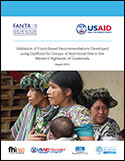In Guatemala, where nearly half of children under 5 are stunted, FANTA worked to identify strategies to improve the nutritional quality of diets in the Western Highlands for children 6–23 months of age and pregnant and lactating women based on locally-available foods. In partnership with the Instituto de Nutrición de Centro América y Panamá (INCAP), FANTA used the Optifood tool to identify a set of evidence-based and population-specific dietary recommendations known as food-based recommendations for these target populations. The Optifood tool determined that consuming adequate amounts of iron, zinc, and calcium were difficult using local foods, and that in some cases micronutrient supplementation would be needed. Based on these findings, a set of targeted food-based recommendations—such as feeding a child 6–11 months beans three times a week—were developed based on the nutritional requirements of the target population, nutrient content of locally available food, dietary preferences and patterns, and the cost of local foods.
In order to field test the food-based recommendations, mothers of children 6–23 months of age along with pregnant and lactating women were asked to try each recommendation and provide feedback on whether they were acceptable to the family and feasible to implement. The respondents generally indicated that the food-based recommendations were acceptable and most families attempted to try them. However, results showed that while some of the recommendations were feasible, others were challenging to implement with the recommended frequency and quantity, partly due to financial constraints and lack of regular access to markets. Based on the results of the household trials and Optifood analysis, a revised more feasible set of recommendations is presented for promotion. Additionally, a monitoring and reporting tool was created to help projects monitor implementation of the FBRs.
Implementation
Validation of Food-Based Recommendations
Executive Summary (in English)
Final Report (in English and in Spanish)
Summary Results for Young Children (in English and in Spanish)
Summary Results for Pregnant and Lactating Women (in English and in Spanish)
Development of Food-Based Approaches
Research Brief (in English)
Summary Report (in English and in Spanish)
Full Report (in English and in Spanish)



